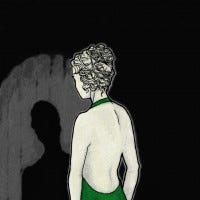Analysis: Get Me Another Triple Soy Latte, Stat - Narrative In My Life Story
In this Gamasutra column, Emily Short looks at storytelling and narrative in games of all flavors, including the casual, indie, and obscurely hobbyist. This week she looks at GameFools' casual life simulator game <a href ="http://www.bigfishgames.com/down

[In this Gamasutra column, Emily Short looks at storytelling and narrative in games of all flavors, including the casual, indie, and obscurely hobbyist. This week she looks at GameFools' casual life simulator game My Life Story.] I admit it: I have become oddly fascinated with life simulators. They're so similar in externals, and yet convey such wildly varying messages -- almost all of them creepy in some way. The Sims famously frames a consumer life as one in which buying stuff makes your life better and better: a house full of purchased goods is a house that puts the characters in a good mood -- and one that offers the player a lot to play with. Kudos frames objects as tools for self-improvement as the player tries to achieve a more exciting and well-paid existence. Life Quest offers a relatively even gradation of difficulty and changes the challenges through competition with the protagonist's acquaintances. My Life Story has many of the same features: a combination of jobs and education, food and goods for the home. The player's challenge is to distribute her time between these items. But the flavor of the game is very different. First, My Life Story largely avoids the question of relationships, either friendly or romantic. This keeps it from making those relationships too utilitarian, which often has an odd effect; but it does make the game feel a little bit lonely. The protagonist starts out as a recent high school graduate living in Mom's basement, but one of the earliest available goals is to move out of there, and afterwards there is little Mom has to offer to make it worth going home again. For the most part, the protagonist lives and works in a lonely way. Second, the game makes progress grim and wearing. All possible jobs decrease your stats in "hunger," "energy," "health," and "fun" to some degree, forcing you to take some time off for food or a workout. (And something that recharges one stat often takes away from another, so drinking a lot of coffee recharges the energy bar at cost to the health bar. It takes a lot of juggling to get the stats bars all back near the maximum.) But the better you get at your work, the more difficult and exhausting that work becomes. Working as a barista or a retail sales clerk is fairly undemanding and easy to recover from. Working in a high-end job after lots of training -- say, as a geneticist -- is brutally exhausting. You can only do a short stint before needing to stagger away for expensive spa treatments and luxury meals to recoup your strength as rapidly as possible. Fail to do this, and you will collapse and have to go to the hospital. Possessions play into the same scheme. You can buy goods for your apartment, and their purpose is to restore your stats during the weekend periods. Money is in such plentiful supply compared to everything else that I found myself buying every possible good as soon as it came onto the market -- possessions are unveiled slowly over the course of the game, and such useful, high-end purchases as a VCR (really?) don't become available until quite late. Two other features make the game significantly easier and also more entertaining at the beginning than at the end. One is just scaling: the further you go, the more time you have to spend on each job or bit of education in order to level up. Leveling up as a geneticist takes a lot of concerted effort. Second is the role of achievements in the game. There are lots of achievements available, for spending various amounts of time doing various tasks. Completing an achievement earns a "life card," which can be used to trigger bonuses: extra recouperation on weekends, say, or "health care" (which lets you survive a hospitalization without losing half your money in the process), or cards that make you immune to drain in some specific area. Those cards add an element of tactical planning to the early and mid-game: it makes more sense to take a job that's very hard on your health, for instance, if you happen to be holding a card that makes you immune to health drains for the period of one week.  But as you clear the easy achievements off the boards, these cards come along more and more rarely. Progress through the highest levels is the slowest, dullest, most grinding and same-y part of the experience. So in this game, the purpose of existence is to work. You're not trying to make your life fulfilling, exactly -- education is strictly pragmatic, relationships are absent, and there's no sign of taking an intellectual value out of either study or employment. And you're not trying to achieve opulence or status, as both The Sims and Life Quest sometimes suggest. The goal of living is simply to be working, and the final triumph of the game is to win one's "dream job." Meanwhile, the resource in scant supply is well-being. All the physical pleasures and comforts that life affords -- a friendly dog, a relaxing spa treatment, a good meal -- exist only as means to keep you together long enough to keep going. In the later stages, you're losing all of your well-being qualities so rapidly that you more or less have to resort to luxury goods (as opposed to cheap burgers and a jog in the park) to keep them restored. It's a cycle that comes to feel deeply unhealthy. Everything you do when you're not on the job or in school is essentially self-medicating. If the game had introduced cocaine and vodka as additional resources, that wouldn't have seemed the slightest bit out of keeping with the procedural rhetoric of the rest. So despite its cheery art and nominally happy finish, there is a screaming existential horror embedded in My Life Story. Something about finding out that "good" jobs are terrible for you; that luxuries aren't really luxuries but merely a kind of medicine for desperately overworked and unhealthy people; that the grind only gets grindier and more exhausting as we run out of the resilience and optimism of youth. In that light, it's hard to take it seriously when the game tells you you've got your dream job, the one that's going to give you positive points in all your well-being stats and let you live happily forever after. And yet of course you never get to play in that mode, not even for a few minutes of coda. Frankly, I don't believe the happy ending. The game has done too good a job of teaching me how its horrible little universe really works. (Disclosure: I played a copy of this work that I purchased at full price. I have had no commercial affiliations with the publisher at the time of writing.) [Emily Short is an interactive fiction author and part of the team behind Inform 7, a language for IF creation. She also maintains a blog on interactive fiction and related topics. She also contracts for story and design work with game developers from time to time, and will disclose conflicts with story subjects if any exist. She can be reached at emshort AT mindspring DOT com.]
But as you clear the easy achievements off the boards, these cards come along more and more rarely. Progress through the highest levels is the slowest, dullest, most grinding and same-y part of the experience. So in this game, the purpose of existence is to work. You're not trying to make your life fulfilling, exactly -- education is strictly pragmatic, relationships are absent, and there's no sign of taking an intellectual value out of either study or employment. And you're not trying to achieve opulence or status, as both The Sims and Life Quest sometimes suggest. The goal of living is simply to be working, and the final triumph of the game is to win one's "dream job." Meanwhile, the resource in scant supply is well-being. All the physical pleasures and comforts that life affords -- a friendly dog, a relaxing spa treatment, a good meal -- exist only as means to keep you together long enough to keep going. In the later stages, you're losing all of your well-being qualities so rapidly that you more or less have to resort to luxury goods (as opposed to cheap burgers and a jog in the park) to keep them restored. It's a cycle that comes to feel deeply unhealthy. Everything you do when you're not on the job or in school is essentially self-medicating. If the game had introduced cocaine and vodka as additional resources, that wouldn't have seemed the slightest bit out of keeping with the procedural rhetoric of the rest. So despite its cheery art and nominally happy finish, there is a screaming existential horror embedded in My Life Story. Something about finding out that "good" jobs are terrible for you; that luxuries aren't really luxuries but merely a kind of medicine for desperately overworked and unhealthy people; that the grind only gets grindier and more exhausting as we run out of the resilience and optimism of youth. In that light, it's hard to take it seriously when the game tells you you've got your dream job, the one that's going to give you positive points in all your well-being stats and let you live happily forever after. And yet of course you never get to play in that mode, not even for a few minutes of coda. Frankly, I don't believe the happy ending. The game has done too good a job of teaching me how its horrible little universe really works. (Disclosure: I played a copy of this work that I purchased at full price. I have had no commercial affiliations with the publisher at the time of writing.) [Emily Short is an interactive fiction author and part of the team behind Inform 7, a language for IF creation. She also maintains a blog on interactive fiction and related topics. She also contracts for story and design work with game developers from time to time, and will disclose conflicts with story subjects if any exist. She can be reached at emshort AT mindspring DOT com.]
Read more about:
2011About the Author(s)
You May Also Like







.jpeg?width=700&auto=webp&quality=80&disable=upscale)








